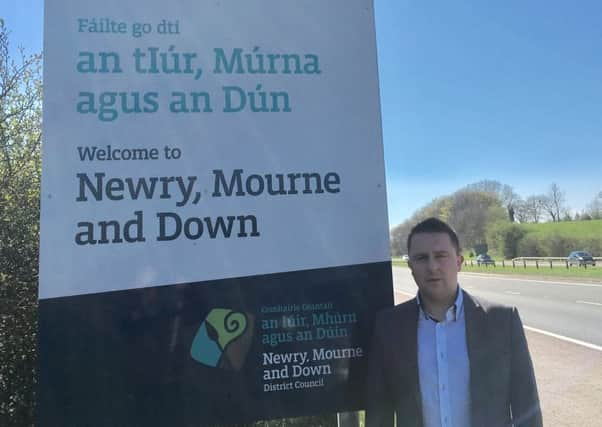'˜Irish language crusade is leaving unionist minority uncomfortable'


Sinn Fein says an Irish Language Act – which would guarantee the use of Irish across much of public life – is a key demand in the current talks at Stormont with other parties.
But Newry, Mourne and Down District councillor David Taylor (UUP) is uncomfortable about an Act, saying the unionist minority in his council is already suffering under “a clear political and ideological crusade” by nationalist representatives over Irish.
Advertisement
Hide AdAdvertisement
Hide AdThe council’s Irish Language Strategy has resulted in dual language signage across the district which “sits very uncomfortably with the minority Unionist community,” and places an “additional unnecessary burden” on ratepayers, he said.
Nationalists have “blatantly chosen to ignore concerns raised by unionist representatives” as they seek to implement “deeply flawed and divisive strategies,” he added.
He is concerned that an Irish Language Act would incur “significant” costs and cause major implications for government, public bodies and the judicial and education systems.
Diverse cultures must be embraced, he said – but he does not accept the Irish Language being offered “a superior status”.
Advertisement
Hide AdAdvertisement
Hide AdIndependent councillor for the district Henry Reilly said: “The saturation of council buildings and facilities with Gaelic is very off-putting to many people who regard it as a indication that you are not welcome or you are a lesser being because you are ‘not one of us’.”
He witnessed “division and suspicion” arising from bi-lingual signs on one country road, which were “ripped out at the Protestant end and allowed to remain at the Catholic end”.
“Many Roads in Crossmaglen and South Armagh are ‘English only’ with no demand to have them bi-lingual, and that reinforces the view that the language is used as a political tool in unionist areas.”
But Sinn Fein councillor Barra Ó Muirí responded that the Irish language “belongs to all the people of Ireland, north and south”.
Advertisement
Hide AdAdvertisement
Hide AdThe 2011 census found 17.2% of people in Newry and Armagh have some knowledge of Irish – much higher than the 10.7% Northern Ireland average, he said.
The commitment to an Irish Language Act in the St Andrew’s Agreement must be implemented, he said, adding it was a case of Sinn Fein “standing up for respect, integrity and equality for all”.
Ciarán Mac Giolla Bhéin from Conradh na Gaeilge (The Gaelic League) suggested bringing bi-lingual signage in on a phased basis as signs need to be replaced, to minimise costs, and allow time to explain the changes.
“If bi-lingual signage was only in place in areas where there was overwhelming support, this could reinforce the ‘demarcation of territory’ and lead to more entrenched attitudes relating to the Irish language,” he added.